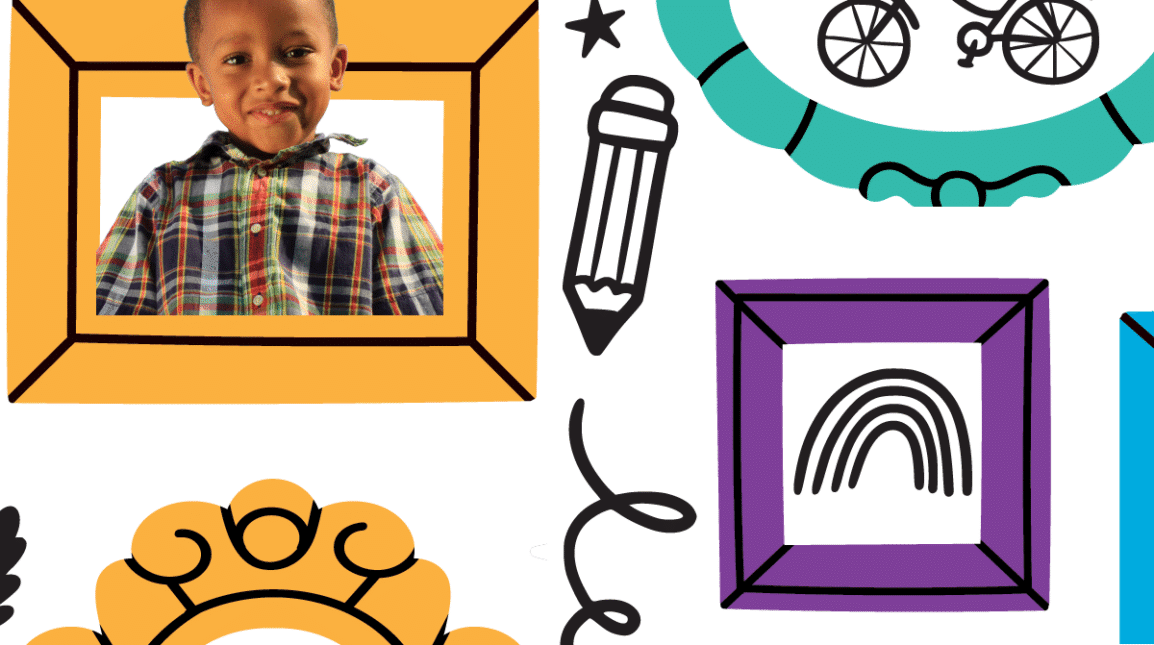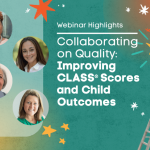Kindergarten readiness (sometimes called “school readiness”) means a lot of things to a lot of people … but what exactly is it? The (too) easy answer is to say there’s a checklist: A child is kindergarten ready, or school ready, if they know what they should know and can do what they should do.
However, it’s far more complex than that.
Many experts believe school readiness is not just about knowledge and ability. It’s about having a willing attitude and confidence in learning. It’s about social-emotional skills, communication skills, and other healthy approaches to learning. Plus, even if kindergarten readiness were just a checklist, who actually gets to decide what goes on that checklist? It turns out that every state is different.
The lack of a clear, shared definition of kindergarten readiness is causing concern among educators. Without a common understanding, it’s challenging to ensure fair practices and equal investment in preparing all children for school. It also raises questions about access to early learning experiences and the role of academic versus social-emotional skills in readiness. This situation calls for a fresh look at how we approach early childhood education and school preparation.
One thing’s for sure: Kindergarten readiness doesn’t start the day, the month, or the year before the first day of school. It’s all about a child’s earliest experiences and the whole of their Birth-5 educational opportunities.
Understanding Kindergarten Readiness
As we mentioned, kindergarten readiness extends far beyond a simple checklist of abilities. Convened in 1990, the National Education Goals Panel (NEGP) declared “all children in America will start school ready to learn” as the nation’s top educational goal. This declaration, while well-intentioned, raised concerns among early childhood experts.
The National Association for the Education of Young Children (NAEYC) offered an important perspective on this goal, reminding everyone that learning doesn’t start in kindergarten. Infants, toddlers, and preschoolers are constantly learning, often at a more rapid pace than their older counterparts. This perspective shift highlights the importance of early childhood experiences in shaping a child’s readiness for formal schooling.
Despite this debate, the NEGP’s framework for kindergarten readiness remains influential. It identifies five key areas of development crucial for school readiness:
- Physical well-being and motor development.
- Social and emotional development.
- Approaches to learning.
- Language development.
- Cognition and general knowledge.
Each of these contributes uniquely to a child’s preparedness for formal schooling. For instance, cognitive skills form the bedrock of academic readiness, while social-emotional skills enable children to form relationships and navigate the social landscape of a classroom. Physical development impacts a child’s ability to engage in classroom activities, and approaches to learning fuel a child’s curiosity and persistence in facing new challenges. And language development — well, we believe it might be the most important one of them all!
At LENA, we believe that we can effectively address both sides of the readiness debate. We do that by focusing on early childhood education and providing resources for the earliest years. Early talk is a powerful equalizer, laying the foundation for kindergarten readiness long before a child reaches school age. Our programs are designed to enhance interactive talk and language environments. They offer a scalable, cost-effective approach to embedding kindergarten readiness within early childhood experiences. By nurturing these crucial skills from the start, we’re not just preparing children for kindergarten. We’re setting them up for lifelong learning success.
Key Factors Influencing Kindergarten Readiness
A child’s readiness for kindergarten is shaped by a complex interplay of factors. The family environment plays a pivotal role. Parent-child interactions, exposure to language and literacy, and the overall emotional climate of the home significantly influence a child’s development. High-quality early learning experiences, whether in formal early childhood education settings or through enriching home activities, contribute substantially to kindergarten readiness. These experiences provide children with opportunities to develop crucial skills and foster a positive attitude towards learning.
Community resources, such as libraries, parks, and health services, also play a significant role in supporting children’s development and readiness for school. Studies show communities investing in early childhood resources often see higher rates of kindergarten readiness among their youngest residents.
The importance of these factors is further highlighted by research from the Early Childhood Longitudinal Study. They found that “children who enter kindergarten with stronger cognitive skills tend to perform better academically in later years.”
Different Perspectives on Kindergarten Readiness
Kindergarten readiness now includes diverse perspectives on preparing children for school success.
- Child-Focused View: This perspective emphasizes the child’s individual skills, knowledge, and developmental milestones as indicators of readiness. It often relies on assessments of specific abilities to determine a child’s preparedness for kindergarten. Proponents argue that this approach helps identify areas where children may need additional support before entering formal schooling.
- School-Focused View: Contrasting the child-focused view, this perspective argues that schools should be ready to meet the diverse needs of all incoming students, regardless of their individual skill levels or backgrounds. It emphasizes that schools must be ready to address the diverse needs of the children and families in their community and be committed to the success of every child.
- Ecological Perspective: The NEGP framework advocates for an ecological perspective, recognizing that readiness emerges from the interplay between children, families, early environments, schools, and communities. This holistic view acknowledges that readiness is not solely a characteristic of children but a product of their experiences and environments.
It’s evident that the concept of kindergarten readiness is far more nuanced than initially perceived. The mix of child, environment, and school factors challenges how we measure and support readiness across diverse groups.
Controversies Surrounding Kindergarten Readiness
Children, Schools, or Both?
The concept of kindergarten readiness has sparked intense debate among educators, policymakers, and researchers. At the heart of this controversy lies a fundamental question. Should we focus on preparing children for school, or should schools adapt to meet the diverse needs of incoming students?
Arguments for child-focused readiness emphasize the importance of individual skills and developmental milestones. Proponents of this view argue that assessing specific abilities helps identify areas where children may need additional support before entering formal schooling. Many educators believe that children should possess certain basic skills, such as being able to communicate needs and follow directions before starting kindergarten.
On the other hand, advocates for school-focused readiness contend that schools bear the responsibility of adapting to meet the varied needs of all students. This perspective aligns with the idea that schools should create environments conducive to learning for children at all developmental stages.
The Academics: Too Much, Too Soon?
Another growing concern in the debate around school preparedness is the increasing academic pressure placed on young children. As kindergarten curriculums have become more rigorous, some worry that the emphasis on academic skills overshadows other crucial aspects of child development.
The shift towards more academically focused kindergarten programs has child development experts begging the question, ‘Is there too much focus on academics?’. Are we sacrificing other developmental areas for the sake of equating school readiness with academic skills? It often seems so. This trend may inadvertently create stress for young learners and overlook the importance of play-based learning in early childhood education. Plus, early childhood educators must negotiate between what they know works in the early years and what the school readiness standards-based assessments tell them matters.
All that said, there’s a clear link between being ready for kindergarten and meeting later academic milestones, including third-grade reading proficiency. Third grade is a pivotal juncture in a child’s educational trajectory. It represents a shift from “learning to read” to “reading to learn,” a transition that fundamentally alters the nature of classroom instruction and academic expectations. According to one research study from the Annie E. Casey Foundation, “Students who don’t read proficiently by third grade are four times more likely to leave high school without a diploma than proficient readers. This risk is even more pronounced for children from low-income families, who are 13 times less likely to graduate on time compared to their more affluent, proficient-reading peers.”
As children progress from early learners to kindergarteners and then to third graders, their early experiences and skills continue to shape their academic outcomes. The answer to boosting third-grade reading proficiency is not to push academic expectations down into the earlier years. Rather, it’s to recognize that the early years lead to readiness for kindergarten. This in turn leads to third-grade reading proficiency.
Balancing Opportunities: Ensuring Fair Access to Readiness
The conversation around school readiness inevitably touches on the issue of fairness in educational opportunities. Children enter school with vastly different backgrounds, experiences, and resources, which can significantly impact their preparedness for formal education.
Research highlights that children from economically disadvantaged backgrounds often start school behind their peers in vocabulary development and early literacy skills. This gap in early learning experiences can have long-lasting effects on academic achievement.
Addressing these disparities requires a dynamic approach. Community investments in early childhood resources can play a crucial role in leveling the playing field. Making access to quality early childhood programs and preschools more readily available in rural and underrepresented communities will also help. Additionally, tailoring readiness assessments and support to account for diverse cultural and linguistic backgrounds can help ensure that all children have a fair chance at success.
Families as Partners
The role of families in helping their children prepare for school has come under increasing scrutiny. While family involvement is crucial for child development, there’s a growing concern about the pressure placed on families to have their children “ready for kindergarten.”
For example, the “Kindergarten Readiness” guide from First Things First, Arizona’s statewide early childhood agency, emphasizes that families are a child’s first and most important teachers. However, this responsibility can feel overwhelming, especially for families facing socioeconomic challenges or those unfamiliar with the education system.
Striking a balance between empowering caregivers and providing necessary support is key. Community programs that offer resources and guidance to families can help alleviate the perceived burden while fostering positive adult-child interactions that contribute to school readiness.
The path forward requires a distinct understanding of child development, a commitment to educational justice, and a willingness to adapt our systems to meet the needs of all young learners. A one-size-fits all approach certainly falls short. Kindergarten readiness is clearly a shared responsibility. By addressing these controversies head-on, we can work towards a more inclusive and effective approach to early childhood education that sets the stage for lifelong learning and success.
The Early Learning Continuum: Interventions and Support Strategies
While kindergarten readiness is a crucial milestone, it’s just one step in a child’s educational journey leading up to another critical benchmark: third grade reading proficiency.
As children progress from early learners to kindergarteners and then to third graders, their early experiences and skills continue to shape their academic outcomes. This continuation of learning, from infancy through third grade, is particularly crucial for reading proficiency, a key indicator of long-term educational success.
The domino effects of early reading proficiency extend far beyond the elementary school years. Research also shows that children who are not reading proficiently in third grade are four times more likely to drop out of high school than proficient readers. This educational gap translates into significant economic consequences. High school dropouts earn about $10,000 less per year than those with a high school diploma, and about $36,000 less than those with a bachelor’s degree.
Bridging the Gap
To bridge early learning and third-grade reading, experts have created various support strategies. The effectiveness of these approaches is supported by research:
- Early Literacy Programs: A meta-analysis of 38 studies found that children who participated in high-quality preschool programs gained about a third of a year of additional learning across language, reading, and math skills. Additionally, studies have shown that the return on investment for high quality early education programs is 7%-10% through better education, economic, health, and social outcomes.
- Family Engagement: The “Reach Out and Read” program, which provides free children’s books to low-income families and teaches parents effective reading strategies, has been shown to increase the frequency of parents reading to children by 40%.
- Technology-Enhanced Learning: LENA Grow, a professional development program for increasing early talk and improving language development in early childhood settings, has demonstrated significant impacts.
The path from early childhood education to kindergarten readiness and ultimately to third grade reading success is clear. A comprehensive, collaborative approach, involving families, educators, and communities, is needed.
Building Foundations for Lifelong Learning Success
As we’ve seen, kindergarten readiness is a dynamic concept going beyond simple checklists of skills. It includes a child’s physical, social-emotional, and cognitive development, and their learning approach. The debate between child-focused and school-focused readiness highlights the need for a balanced approach that prepares both children and schools for successful transitions.
Early interventions, particularly in language and literacy, play a critical role in setting children on the path to kindergarten readiness. Hence, reading proficiency by third grade, a key indicator of long-term academic success, is more likely. By embracing a holistic view of school readiness and implementing evidence-based strategies, we can better support all children in their educational journeys.
Ready to transform early learning environments and set children on the path to school success? Discover how LENA Grow can revolutionize your approach to kindergarten readiness. Our innovative professional development program provides educators with powerful, data-driven tools to boost interactive talk and build crucial language skills. Give your students the early advantage they deserve and empower early childhood educators to feel more confident and satisfied in their role. Learn more about LENA Grow here!
[webinar]



